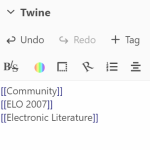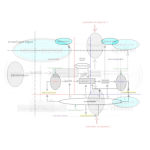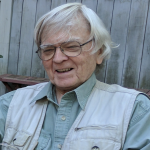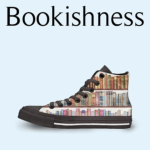electropoetics
A Personal Twine Story

In a keynote delivered at ELO 2024, Chris Klimas recounts ELO 2007 and the creation of Twine. In doing so, he highlights the importance of community and open-source software in fostering digital creativity, while pondering the possibility of a platform dark forest.
The Praxis of the Procedural Model in Digital Literature, Part 1: Structural Aspects of the Model

Phillipe Bootz defines and situates a set of artifacts, devices, material components and human groups that are in contact with earlier procedural "dispositifs." The procedural model, in Bootz's 30 year long research, analyses, theoretical frameworks and observations, expressly distinguishes human beings from material components. In opposition to artificial/human proposals such as the trans-human or the cyborg. The dispositif, in Bootz's presentation, only concerns the physical world. It does not contain signs, is not concerned with literature or art. And neither are individuals, within the procedural model, considered for themselves. They are actors at a given moment. Their positions are characterized by their power to directly act on the artifacts and objects of the dispositif.
Remembering Robert Coover

Scott Rettberg and Robert Arellano's collection of interviews "with critics, creative writers, students, and friends of Coover" to commemorate the passing of one of the pioneers in electronic literature.
Off Center Episode 10: Immersive Storytelling in Augmented Reality and Virtual Reality with Caitlin Fisher

In this episode of "Off Center," Scott Rettberg, Director of the Center for Digital Narrative at the University of Bergen, interviews Caitlin Fisher, a pioneer of immersive AR and VR and Director of the Immersive Storytelling Lab at York University.
Affect Aesthetic and Politics of the Book

A Review of Bookishness, by Jessica Pressman.